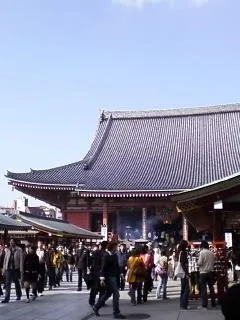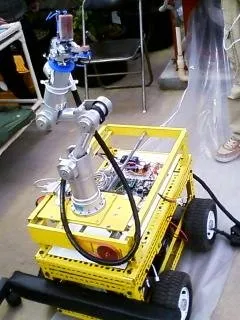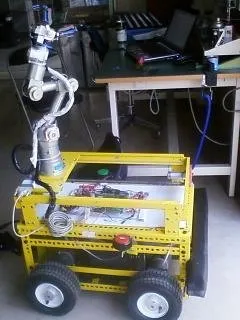Does having a robot on an organic farm make it non-organic?

In early Spring 2007, I was on a transcontinental flight from Ottawa, Canada to Tokyo, Japan. Before boarding, I had to check in an unusually large carton in the special checkin counter named "oversize luggage".When I arrived at immigration in Japan, I was beckoned by customs officials towards my carton. There were half a dozen Japanese customs officers looking with mild suspicion at the contents of the carton. The questions they asked were neutral, but asked curtly.
Inside, the carton, was a partly disassembled autonomous strawberry plucker robot. I used the moment to double check that it was packed as well as when I had last seen it in Ottawa.
Soon after, they looked at my passport, and noticed that my nationality did not match the address markings on the contraption I was lugging along. Finally, the English speaker among them asked me where I was from. I carefully explained to them that I am an Indian citizen, working for a Canadian robotics firm, making prototype agricultural robots for the Japanese department of Agriculture. At this, their faces lit up, and they waved me through with a bow.
The cultural novelty of my first visit to Japan was tempered by the fact that I had had to frantically work towards a "demo" deadline. While I had been working on the base of the robot in Ottawa, my colleagues, Dr. Tomohiro Kawahara, then a computer vision researcher Hiroshima University and Dr. Mototaka Suzuki, then a Postdoctoral research fellow at Columbia University had been working on the vision arm, ultrasonic sensor and grasper parts of the robot. My job in Tokyo was to put it all together and "demo" it. For this, I needed to integrate the parts, and make operate as a single machine, rather than multiple ones. I also had to fine-tune it and make sure it actually did what it was meant to do - pluck strawberries!


When I visited the "demo" location at the Department of Agriculture, I was a little taken aback. It was my first look at aquaponics. Here were rows of strawberry plants set in troughs at a height of about 5 feet above floor level in a large greenhouse. The plants had been meticulously spaced and pruned (by hand). In amongst the foliage dangling on either side of the trough, were ripe strawberries, waiting for their picking by our robot. (The bonus of having plucked them, was of course that one was then entitled to eat them)
The sight of the "demo venue" had me aghast, but excited at the same time.
Aghast, because as a child I had spent time wandering our rural farm in Kerala with my maternal grandfather, who did everything by hand. He would have thought of this highly industrially looking system as "unnatural".
Excited, because I felt like I was somehow indirectly keeping up the family tradition in agriculture - and perhaps enhancing it by working with pioneering technology. In my mind's eye, I envisioned the future of the human species - fed and clothed by armies of autonomous farming machines, while we humans spent our leisure at more interesting pursuits (little did I know that this was the exact pipe dream of industrialists at the turn of the century).
It's been almost a decade since I left Tokyo and agricultural robots. In the meantime, I have dipped in and out of the organic agricultural movement - my most intimate moments were when Ryan Corrigan, then a volunteer at Jagori Grameen in Rakkar village in Himachal, took me under his wing. He later pointed me to Spero and Robin Latchis' work near Bir, in Himachal. In Bir, as I squatted down on my haunches to harvest potatoes by hand (I later learned from Ryan that these were easier to harvest with a pitch fork), I wondered to myself if the job could be delegated to a robot. And if it did, what good would it do?
Wouldn't such a robot be taking away the jobs and livelihoods of millions of ordinary farmhands? Would such a robot, assuming it functioned perfectly (not a very good assumption, I discovered during the Tokyo "demo"), be able to pick produce at the right time of growth and maturation, assuming it was completely autonomous? Wouldn't such a robot be assisting in encouraging human isolation from the soil? Wouldn't this kind of farming still be "organic", since the robot adapted to the environment, rather than the usual industrial technique of the farm being adapted to the farming machines? Or would it be so, since no human had been involved in its cultivation? Wouldn't farming automation reduce the price of organic produce? Why should a hipster elite alone enjoy the produce of healthy food (assuming organic food is healthier)? Surely the industrially produced supermarket sold food (deemed unhealthy) that the unwashed masses aspire to buy with freshly acquired middle class money and pride would kill them all into non-existence with cancer, diabetes, heart disease, and the like?
As I stood up from my haunches to take a break from harvesting potatoes and day dreaming, my back flashed with pain. The work was almost literally "back breaking". My little middleclass brain had a moment of private revolt. I determined to myself, that I would one day embark on a mission to help design autonomous farming robots again. And those romantic "organic farming is good for you" types could go to their backbreaking hell if they wished to - but I would gladly eat robot farmed (in identical technique to hand farmed) "organic" food - at a cheaper price. Along with the rest of my unwashed sisters and brothers...
These are the very kind of questions we're bringing forth with our Slow Tech magazine. Slow Tech is about bridging the old and the new, how can we take old school sensibilities and merge them with new age tech? How can we bring in the romance of the ol with the function of the new? Have views or want to collaborate, write in to us at slowtech@yourstory.com.
(Disclaimer: The views and opinions expressed in this article are those of the author and do not necessarily reflect the views of YourStory)







